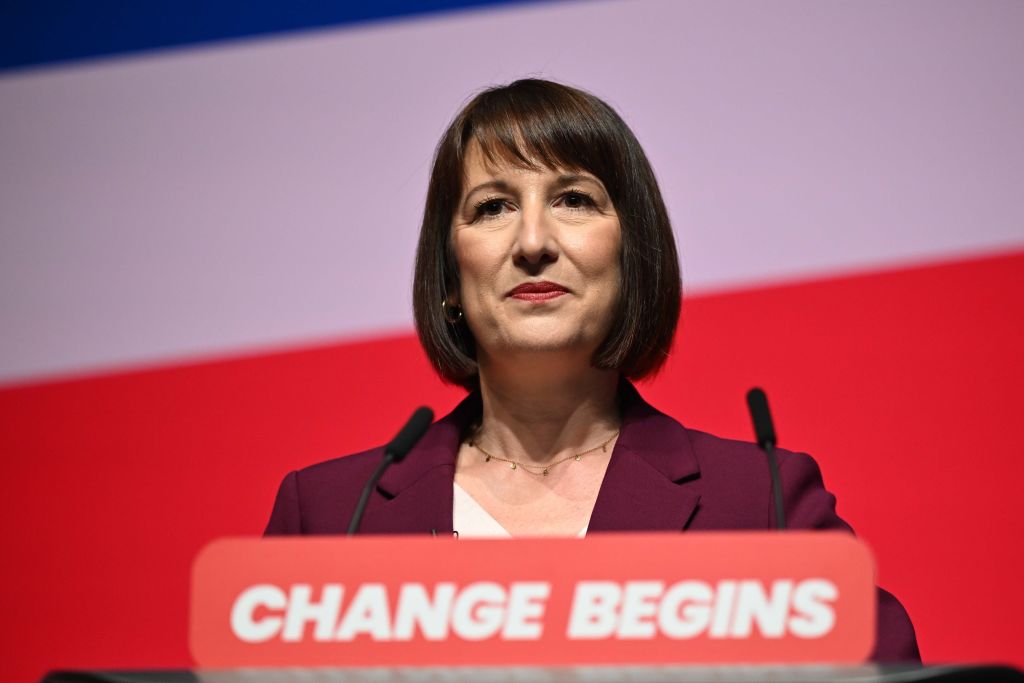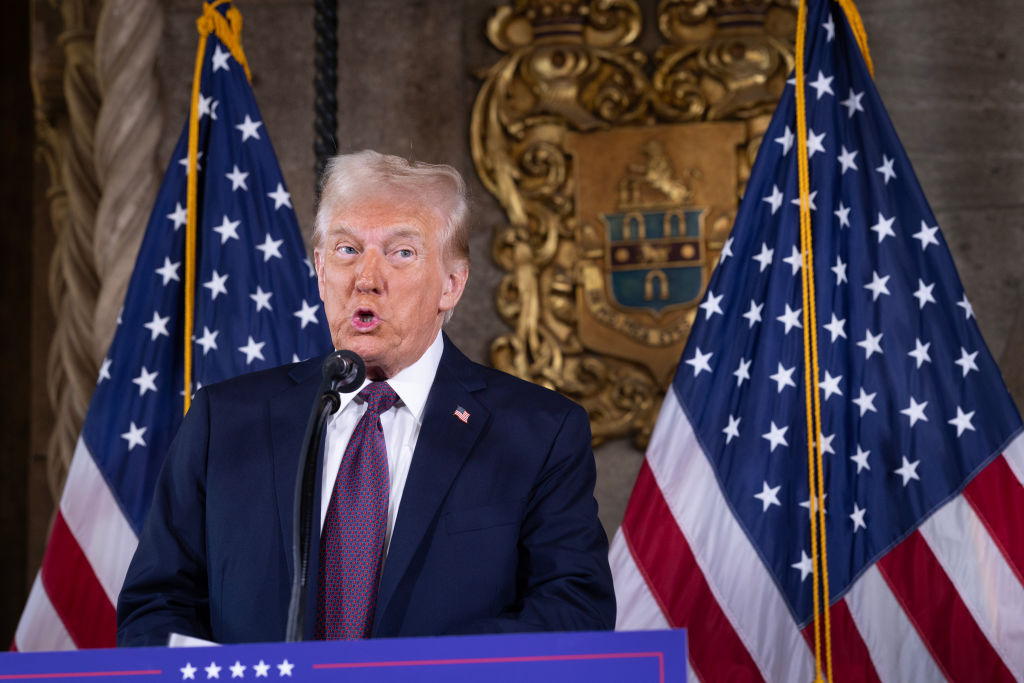Is there hope for the UK economy in 2025?
The economic upswing we enjoyed in the UK in the first half of 2024 has petered out thanks to a darkening global backdrop and concern over new burdens imposed by the government, Julian Jessop says


Get the latest financial news, insights and expert analysis from our award-winning MoneyWeek team, to help you understand what really matters when it comes to your finances.
You are now subscribed
Your newsletter sign-up was successful
Want to add more newsletters?

Twice daily
MoneyWeek
Get the latest financial news, insights and expert analysis from our award-winning MoneyWeek team, to help you understand what really matters when it comes to your finances.

Four times a week
Look After My Bills
Sign up to our free money-saving newsletter, filled with the latest news and expert advice to help you find the best tips and deals for managing your bills. Start saving today!
In the memorable words of one official statistician, Britain’s economy was “going gangbusters” at the beginning of 2024. Unfortunately, last year appears to have ended with a whimper. The best hope now is that this pattern will be reversed in 2025, with a sluggish start giving way to a strong and sustained recovery. But the risks, alas, lie mostly on the downside.
The recent data has certainly been poor. The latest official figures show that the UK economy failed to grow at all in the third quarter of last year. Most forecasters, including the Bank of England, now expect zero growth in the fourth quarter too.
For now, it still looks as if Britain will just about avoid an outright recession, defined as two successive quarters with a contraction in total output. But the UK may already be back in a technical recession in terms of output per head, which fell by 0.2% in the third quarter of 2024 and was set to dip again in the fourth.
MoneyWeek
Subscribe to MoneyWeek today and get your first six magazine issues absolutely FREE

Sign up to Money Morning
Don't miss the latest investment and personal finances news, market analysis, plus money-saving tips with our free twice-daily newsletter
Don't miss the latest investment and personal finances news, market analysis, plus money-saving tips with our free twice-daily newsletter
Last year was therefore a year of two contrasting halves. In the first, the UK managed the joint-fastest growth in the G7 group of advanced economies. But it looked set to finish the second half at the bottom of the league table.
Moreover, almost every survey of private businesses shows that confidence has weakened sharply since the summer, especially among smaller firms. At the same time, inflation is picking up again and recruitment has stalled. This has revived the spectre of “stagflation” – a toxic combination of weak activity, rising inflation, and job losses.
What explains this dramatic turnaround? Firstly, and to be fair to the chancellor, Rachel Reeves, the global backdrop has deteriorated. Germany and France are now facing economic and political crises that, if anything, are even worse than ours. There is growing uncertainty too about the outlook for inflation and interest rates in the US, especially with Donald Trump soon to be back in the White House.
Secondly, and again to be fair to Labour, the strong growth in the first half of 2024 was never likely to be sustained. In particular, the figures were flattered by the rebound from the weakness in the second half of 2023, when the UK economy was in an outright recession. Output per head fell in all four quarters of 2023.
Why is UK economic growth struggling?
The bigger picture is that growth has been sluggish for many years, mostly under the Conservatives. Nonetheless, the words and actions of the new government have clearly not helped. From the beginning, incoming Labour ministers have talked down the economy. The gloomy rhetoric was not entirely unjustified.
The previous government had left plenty of structural problems, including weak productivity, the poor quality of many public services, high levels of economic inactivity with many people no longer looking for work, and record levels of both tax and national debt.
Even so, banging on about the “worst inheritance since World War II”, and the need for “tough decisions” to correct the mistakes of the past, had a chilling effect on business and consumer sentiment.
The rushed announcement of the means-testing of winter fuel payments for pensioners only added to the sense of foreboding.
Reeves’ first Budget then delivered even bigger hikes in taxes and other business costs than most had feared. The new chancellor plans to increase public spending by about 2% of national income. Half of this will be financed with upfront tax increases and half by more government borrowing, which will add to the tax burden in future.
In effect, then, the chancellor intends to transfer another 2% of national income from the private to the public sector, at a time when the tax burden is already at a historic high. No wonder so many businesses are unhappy.
Bond markets did not like the Budget either. Many investors are still worried that the additional public spending will boost inflation and delay cuts in official interest rates; that the additional taxes will not raise as much money as expected; and that the extra borrowing will mean that yields have to rise to attract enough buyers for the additional bonds.
How the Autumn Budget affected companies
The Budget also appears further to have damaged trust in government more generally, undermining the credibility of the pledge not to raise taxes any further. Labour has claimed that the “payslips of working people” were protected because most of the additional revenues were raised from employers’ national insurance (NI). But no serious economist would go along with this. Indeed, there was a time when Reeves herself recognised that employers’ NI is a “tax on jobs”.
The reality is that companies are only paper entities and cannot bear the economic burden of tax rises themselves. This burden is always passed on to real people. The only unknowns are the timing and distribution of the losses.
In the case of the increases in employers’ NI, the Office for Budget Responsibility (OBR) has assumed that just over two-thirds of the additional business costs will be passed on to working people, mostly in the form of lower wages, but also as higher prices.
Moreover, the OBR has assumed that the tax increases will cost 50,000 jobs. The upshot is that, even if the hikes in employers’ NI do not appear in most payslips, they will eat into real incomes, and some people will no longer see a payslip at all.
This is hardly the only example of “gaslighting” by the new government. In the election campaign, the would-be chancellor insisted that “there are no additional tax rises needed beyond the ones that I’ve set out”, and that there were no “black holes” to fill. That promise was barely credible at the time and has since fallen apart.
Even many of those who are more sympathetic to Labour’s plans to boost the state are frustrated. It would be more honest to say that much higher public spending requires much higher taxes and to have raised those taxes in a more straightforward way. And of course, the shift in government policy is not limited to the Budget. State intervention will be ratcheted up even further in many other areas, including the uncertain impact of new net-zero policies on energy bills. Many firms will struggle too with the additional burdens of higher minimum wages and new employment rights, especially in sectors such as retail and hospitality.
Admittedly, the minimum wage has not yet cost many jobs because the demand for workers has been high and because it has been set at a reasonable level, based on independent advice. But this is now changing.
Is the UK economy going to recover?
All is not necessarily lost. Looking past the headlines, most firms are still relatively upbeat about their own prospects, despite their worries about the UK economy as a whole. Consumer confidence also appears to have stabilised, and average incomes should still rise faster than prices, especially for those lower-paid workers who do keep their jobs.
As is the case with businesses, most polls suggest that households are far less anxious about the outlook for their own finances than they are about the general economic situation. Many still have extra savings that were built up during the pandemic and could now be used to support spending too.
Even the Budget itself was not all bad. For instance, the chancellor’s new “fiscal rules”, while still flawed, are an improvement on what went before. Balancing day-to-day spending with current tax revenue makes good economic sense, as does tweaking the targeted measure of debt to take more account of new assets as well as liabilities.
The planned increases in public spending should have some positive effects on growth this year and beyond, helping to offset the weakness in the private sector. The OBR has been loath to factor in a bigger boost from the planned increases in public investment until there are more details on how the money will be spent. But there may be some good news still to come here.
In the meantime, the signs of weakening in the labour market, and especially in pay settlements, should at least encourage the Bank of England’s Monetary Policy Committee (MPC) to keep cutting interest rates.
The most likely scenario is a series of gradual cuts, perhaps a quarter point every quarter. But the MPC has already signalled that it might be willing to pay more attention to the downside risks to growth and to lower rates more quickly.
External conditions may improve too. The European Central Bank also has room to cut rates further, and a more flexible approach to fiscal policy might allow the German economy to recover a little faster.
Assuming no more nasty surprises, any UK recession is therefore likely to be shallow by past standards, inflation will probably not rise much further, and unemployment should stay relatively low. This could better be described as a bout of “stagflation-lite”, rather than the far more severe forms that stalked the UK in the 1970s.
This more optimistic take is reflected in consensus forecasts for the UK economy. Independent forecasters expect growth to pick up from around 0.8% in 2024 to 1.3% in 2025. But this would still be less than the 2% assumed by the OBR for the Budget. The mechanical application of the new fiscal rules could then require another round of tax increases to fill the gap in the public finances. In turn, this could fuel a doom loop of lower confidence, weaker economic activity, lower tax revenues, higher borrowing costs – and more tax rises. As it is, the textbook economic models rarely give enough weight to sentiment. Unless corporate and consumer confidence recovers quickly, my best guess is that the UK economy will expand by no more than 1% this year, with a good chance that growth is actually lower in 2025 than the 0.8% or so achieved in 2024.
What Donald Trump's presidency means for the UK

Donald Trump will be sworn in as the 47th president of the US on 20 January
The impact of a second Donald Trump presidency is one of the biggest unknowns, but also counts as a downside risk. So far, investors in US equities have reacted positively to the prospect of another burst of “Trumponomics” or, as the man himself puts it, “MAGAnomics”.
In part, this reflects the relief that Trump defeated Kamala Harris. The Democrats offered a mess of interventionist policies with a record of failure elsewhere. There are hopes too that the second Trump administration will be more conventional than the first, which itself was not as chaotic as many had feared.
But there is still plenty that could go wrong. Trump made a large number of pledges and threats during the election campaign, including punitive tariffs on imports into the US, a raft of new and extended tax cuts, an all-out assault on red tape and government waste, mass deportations of undocumented workers, and more domestic production of oil and gas. Most of these measures should be positive for growth, at least in the short term. However, there is a high chance that one or more will fail badly.
The main concern is the impact of tariffs. Trump has promised to impose additional taxes of at least 10% on all imports, rising to 60% on imports from China. Some have dismissed this threat as just a bargaining tool, but his avowed love of tariffs means we should take it seriously.
There are a number of ways these could backfire. One is simply that the pass-through of the cost of tariffs and the increased demand for domestic goods will combine to push up prices. The US central bank – the Fed – is then likely to keep interest rates higher for longer, strengthening the dollar. Any benefit to the US trade balance is also likely to be undermined by retaliation from the EU and China.
This policy is not necessarily doomed. The Fed might be willing to look past a step increase in the price level as the economy adjusts to the higher cost of imports, provided the rate of inflation is not permanently higher. The additional tariffs will at least be a new source of government revenue too.
What could this mean for the UK? While there are no winners in a trade war, the British economy should at least be hit less hard than many others. More than two-thirds of our exports to the US are services, which will be largely unaffected by any new tariffs. There is also a good chance that Trump will be willing to treat the UK more favourably than Mexico, the EU and China, with whom the US runs large deficits. By contrast, the US data show a small surplus in goods trade with the UK.
That said, any exemptions for UK exports to the US might require a separate trade agreement, assuming Trump plays by the rules. But the early indications are that a deal will be on the table, and that the US is no longer likely to demand unpalatable concessions on food standards in return. If so, this could be another “Brexit benefit”.
Instead, the greatest risk to the UK economy may be the spillover from higher US interest rates. In the worst-case scenario, the US may be moving closer to a long-overdue fiscal reckoning. The US government has been able to run large budget deficits and build up a mountain of debt partly because of the relative strength of the US economy and partly because of the advantage of borrowing in what is still the world’s dominant reserve currency. But this could also change, especially if the US picks a fight with the major holders of its debt – notably China.
The upshot is that another burst of stronger growth and higher inflation in the US could add to the pressures on the public finances in the UK. This is a particular concern because the cost of government borrowing in the UK is now closely tracking that of the US again. And even in the US, a longer period of high interest rates could finally challenge the extreme valuations of technology stocks, sending further shockwaves around global markets.
Can a supply-side approach boost economic output?
If there is hope for the UK economy, it lies in structural reform. Labour has talked a good talk on the benefits of liberalising planning rules and pensions, lighter regulation of financial services, and more support for housebuilding and infrastructure projects.
There will be a new drive to lift efficiency in public services, especially by improving working practices and the use of technology in the NHS. And looking just a little further afield, there are some simple ways in which the UK-EU trade agreement could be improved without reversing Brexit.
But politicians have made similar promises in the past and failed to deliver. Already the new government is sending some mixed signals. In the health sector, for example, health secretary Wes Streeting has simply announced yet another (three-year) review of social care.
Regulations in the labour market are actually being tightened. Some pension reforms have already been paused. Construction firms are questioning whether there are enough workers and materials to build 1.5 million new homes, even if the opposition from the nimbys can be overcome.
The much-hyped launch of the National Wealth Fund – often trumpeted as one of Labour’s big changes – is little more than a rebranding of the existing UK Infrastructure Bank.
In short, rather than repairing the public finances, the Budget may simply have added to economic uncertainty and weakened the foundations of growth. A cynic might also wonder whether a Cabinet with no real business experience is best qualified to lift the productivity of the public sector and allow the private sector to thrive. I hope I am wrong, but the early signs are not encouraging.
This article was first published in MoneyWeek's magazine. Enjoy exclusive early access to news, opinion and analysis from our team of financial experts with a MoneyWeek subscription.
Get the latest financial news, insights and expert analysis from our award-winning MoneyWeek team, to help you understand what really matters when it comes to your finances.
Julian Jessop is an independent economist. He has thirty-five years of professional experience gained in the public sector, the City and consultancy, including stints at HM Treasury, HSBC, Standard Chartered Bank, and Capital Economics. He now works mainly with think tanks and educational charities, notably the Institute of Economic Affairs, and is a regular commentator in the media.
Julian has a First Class degree in Economics from Cambridge University and further qualifications in both economics and law.
-
 Should you buy an active ETF?
Should you buy an active ETF?ETFs are often mischaracterised as passive products, but they can be a convenient way to add active management to your portfolio
-
 Power up your pension before 5 April – easy ways to save before the tax year end
Power up your pension before 5 April – easy ways to save before the tax year endWith the end of the tax year looming, pension savers currently have a window to review and maximise what’s going into their retirement funds – we look at how
-
 "Botched" Brexit: should Britain rejoin the EU?
"Botched" Brexit: should Britain rejoin the EU?Brexit did not go perfectly nor disastrously. It’s not worth continuing the fight over the issue, says Julian Jessop
-
 'AI is the real deal – it will change our world in more ways than we can imagine'
'AI is the real deal – it will change our world in more ways than we can imagine'Interview Rob Arnott of Research Affiliates talks to Andrew Van Sickle about the AI bubble, the impact of tariffs on inflation and the outlook for gold and China
-
 Tony Blair's terrible legacy sees Britain still suffering
Tony Blair's terrible legacy sees Britain still sufferingOpinion Max King highlights ten ways in which Tony Blair's government sowed the seeds of Britain’s subsequent poor performance and many of its current problems
-
 How a dovish Federal Reserve could affect you
How a dovish Federal Reserve could affect youTrump’s pick for the US Federal Reserve is not so much of a yes-man as his rival, but interest rates will still come down quickly, says Cris Sholto Heaton
-
 New Federal Reserve chair Kevin Warsh has his work cut out
New Federal Reserve chair Kevin Warsh has his work cut outOpinion Kevin Warsh must make it clear that he, not Trump, is in charge at the Fed. If he doesn't, the US dollar and Treasury bills sell-off will start all over again
-
 How Canada's Mark Carney is taking on Donald Trump
How Canada's Mark Carney is taking on Donald TrumpCanada has been in Donald Trump’s crosshairs ever since he took power and, under PM Mark Carney, is seeking strategies to cope and thrive. How’s he doing?
-
 Rachel Reeves is rediscovering the Laffer curve
Rachel Reeves is rediscovering the Laffer curveOpinion If you keep raising taxes, at some point, you start to bring in less revenue. Rachel Reeves has shown the way, says Matthew Lynn
-
 The enshittification of the internet and what it means for us
The enshittification of the internet and what it means for usWhy do transformative digital technologies start out as useful tools but then gradually get worse and worse? There is a reason for it – but is there a way out?
